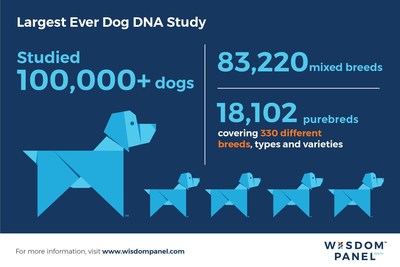Landmark Study Shows Genetic Testing for Dogs Can Help Identify Diseases and Enable Preventive Care for Better Health
BRUSSELS, May 2, 2018 /PRNewswire/ --
Largest Canine Genetic Study Reveals Diseases Mixed Breed and Purebred Dogs Are Prone To Develop


Results from the largest ever study of its kind show that genetic testing can predict if a dog is at risk for developing certain diseases. The study "Frequency and distribution of 152 genetic disease variants in over 100,000 mixed breed and purebred dogs", published in PLOS Genetics was conducted by Wisdom Health and Genoscoper Laboratories. This research is the first to show the genetic diseases mixed breed dogs are most likely to develop. The study also shows that fewer mixed breed dogs than purebreds are affected by the most common disease-causing mutations tested in the study. Knowing a dog's disease-related genetic make-up could enable owners, breeders, and veterinarians to make more informed decisions about a dog's health. The research was based on genetic testing technology that can be used at home.
(Photo: https://mma.prnewswire.com/media/685063/Mars_Petcare_Man_and_Dog.jpg )
(Photo: https://mma.prnewswire.com/media/685064/Mars_Petcare_Infographic.jpg )
"There has been a long-standing perception that mixed breed dogs are less disease-prone than purebred dogs. This DNA-testing-based evidence shows that while mixed breed dogs are in fact less likely than purebreds to develop the recessive disorders evaluated in the study, they may still be carriers. Importantly it's now clear that all dogs can benefit from genetic testing," said Cindy Cole DVM, PhD, DACVCP, General Manager at Wisdom Health. "It's exciting that new diagnostic tools are now available to veterinarians, breeders and owners alike to enable them to make more informed decisions about overall care for dogs."
Testing is key to understanding if a dog will be at risk of developing a genetic disease. Based on the 152 diseases tested:
- Approximately two out of 100 mixed breed dogs are at risk of becoming affected and 40 out of 100 are carriers for at least one of the diseases.
- Approximately five out of 100 purebred dogs are at risk of becoming affected and 28 out of 100 are carriers for at least one of the diseases.
The research also showed that through healthy breeding practices, which often include genetic testing, some diseases appear to have been eradicated from breed pools. With the proactive management of inherited disorders through the use of DNA testing and sustainable breeding decisions, breeders and veterinarians can work to decrease the incidence of genetic diseases in dogs. For example, X-linked Severe Combined Immunodeficiency (XSCID) a mutation originally found in Basset Hounds, appears to have been eradicated.
"For owners, understanding for which genetic diseases their dog is at risk can help them and their veterinarians design a personalized care and wellness program for their dog," said Jonas Donner, PhD, Chief Scientific Officer at Genoscoper. "More broadly, for veterinarians to understand which disorders are common across the overall population is extremely valuable information for the future of proactive medical care. Using genetic tools to further disease monitoring and eradication in different populations, can, over time have a positive effect on both purebred and mixed breed dogs."
About the Study
- The study examined the DNA of more than 100,000 dogs, including 18,000 purebreds representing 330 breeds, types and varieties and 83,000 mixed breed dogs, for the presence of 152 genetic disease mutations.
- Some of the genetic disease mutations tested include:
- Progressive Retinal Atrophy - multiple forms
- Hyperuricosuria
- Collie Eye Anomaly
- Multidrug sensitivity (MDR1)
- von Willebrand's Disease - multiple forms
- The study showed that testing is important to help an owner know if their dog is at risk for one of the genetic diseases tested, such as Exercise-induced Collapse (a neuromuscular disorder) and to consult with their veterinarian about a preventative care plan.
- The three body systems most commonly affected across both the pure and mixed breed dog populations in the study were:
- Vision
- Nervous
- Circulatory
- The study findings underscore the importance of using tools such as the WISDOM PANEL™ Health canine DNA test, in conjunction with ongoing veterinary care.
Resources for Dog Owners
Dog owners looking to take this proactive step in preventative care can test their pets with the new WISDOM PANEL Health canine DNA test. Owners simply swab their dog's cheek at home, activate their kit online and receive their results two to three weeks from the time their sample reaches the lab. It's recommended that owners share these results with their veterinarian and discuss future care. Genetic screening for disease and breed detection is easy, inexpensive and readily available as the WISDOM PANEL Health canine DNA test includes breed identification for 250+ breeds, types and varieties and detection of more than 150 disease-causing mutations.
About Wisdom Health & Genoscoper Laboratories
Wisdom Health is a business unit of Mars Petcare. For more than a decade, Wisdom Health has developed state-of-the-art genetic tests for companion animals, revolutionizing personalized pet care. The Mars, Incorporated acquisition of Finnish technology company, Genoscoper Laboratories, in 2017 enabled Wisdom Health to double their R&D group and help facilitate further product development for international markets. By unlocking the secrets of their dog or cat's genetic health and ancestry, owners, breeders, and veterinarians can work together to tailor wellness programs that fit the one-of-a-kind needs of their unique pet.
For more information, visit http://www.wisdompanel.com and http://www.mydogdna.com or join the conversation on Facebook, Twitter, Instagram and YouTube.
About Mars Petcare
Mars Petcare is a diverse and growing business with 75,000 Associates across 50+ countries dedicated to one purpose: A BETTER WORLD FOR PETS. With 75 years of experience, our portfolio of almost 50 brands serves the health and nutrition needs of almost half the world's pets - including brands PEDIGREE®, WHISKAS®, ROYAL CANIN®, NUTRO™, GREENIES™, SHEBA®, CESAR®, IAMS™ and EUKANUBA™ as well as The WALTHAM Centre for Pet Nutrition which has advanced research in the nutrition and health of pets for over 50 years. Mars Petcare is also the world's largest veterinary health provider through a network of over 2,000 pet hospitals including BANFIELD™, BLUE PEARL™, PET PARTNERS™, and VCA™. We're also at the forefront of emerging innovation and technology for pets, pet owners and veterinarians, with WISDOM PANEL™ genetic health screening and DNA testing for dogs, the WHISTLE™ GPS dog tracker, and LEAP VENTURE STUDIO accelerator and COMPANION FUND™ programs that drive innovation and disruption in the pet care industry. As a family business and guided by our principles of mutuality and freedom, we are privileged with the flexibility to fight for what we believe in - and we choose to fight for: A BETTER WORLD FOR PETS.
About Mars, Incorporated
Mars is a family-owned business with more than a century of history making diverse products and offering services for people and the pets people love. With almost $35 billion in sales, the company is a global business that produces some of the world's best-loved brands: M&M's®, SNICKERS®, TWIX®, MILKY WAY®, DOVE®, PEDIGREE®, ROYAL CANIN®, WHISKAS®, EXTRA®, ORBIT®, 5™, SKITTLES®, UNCLE BEN'S®, MARS DRINKS and COCOAVIA®. Mars also provides veterinary health services that include BANFIELD® Pet Hospitals, Blue Pearl®, VCA® and Pet Partners™. Headquartered in McLean, VA, Mars operates in more than 80 countries. The Mars Five Principles - Quality, Responsibility, Mutuality, Efficiency and Freedom - inspire its more than 100,000 Associates to create value for all its partners and deliver growth they are proud of every day.
For more information about Mars, please visit http://www.mars.com. Join us on Facebook, Twitter, LinkedIn, Instagram and YouTube.
About PLOS Genetics
PLOS Genetics reflects the full breadth and interdisciplinary nature of this research by publishing outstanding original contributions in all areas of biology. The journal's emphasis is on studies of broad interest that provide significant insight into a biological process or processes. Topics include (but are not limited to) gene discovery and function, population genetics, genome projects, comparative and functional genomics, medical genetics, disease biology, evolution, gene expression, complex traits, chromosome biology, and epigenetics.
Contacts:
Angela Hughes
Wisdom Health
+1(530)416-2211
angela.hughes@effem.com
Matt Wagner
Weber Shandwick
+1(303)357-2392
mwagner@webershandwick.com
Share this article